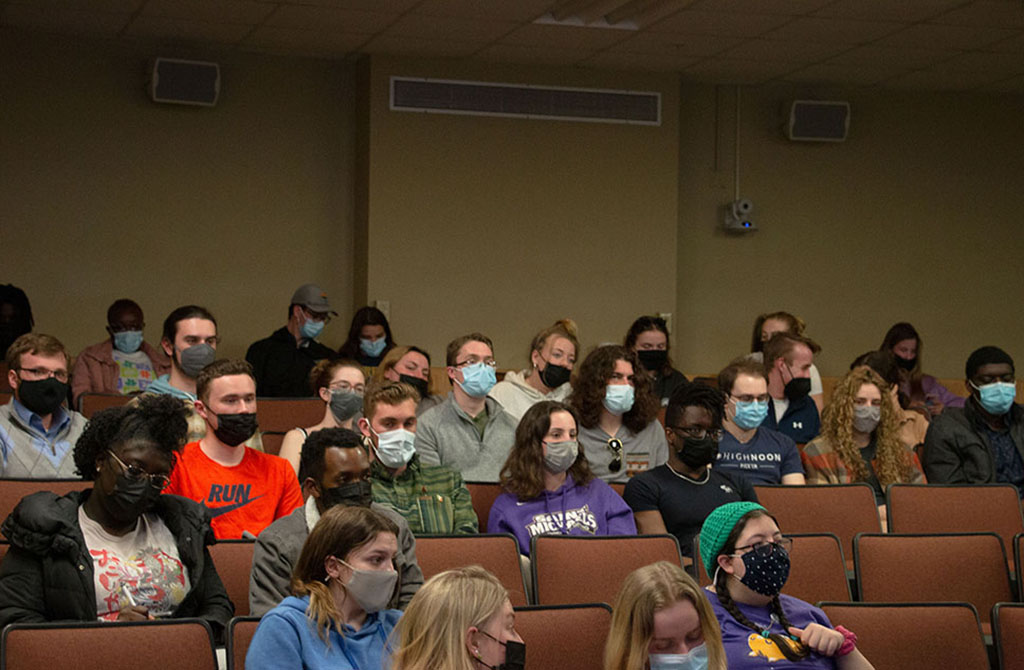
Abby Kittler | Staff Writer | akittler@mail.smcvt.edu
St. Michael’s College announced that masks will only be required in classes, labs, Bergeron Wellness Center and College vehicles effective on April 1, making masks optional everywhere else.
“We waited because we wanted to see the viral load after spring break. Our test results were amazing,” said Dawn Ellinwood, vice president of student affairs. “If the number came out high, that would have told us a story.”
The shift in policy was decided after two rounds of surveillance testing conducted after spring break. The first round of testing resulted in six positive cases, followed by three new cases the following week.
Ellinwood is a member of the Executive Policy Group (EPG), and talked about the many variables that went into this decision. They met with many staff, faculty and students from the Student Government Association (SGA) and COVID Action Network (CAN) to hear their concerns.
“It wasn’t done in a vacuum,” Ellinwood said. “It was done with a lot of input because it is a big deal. There are a lot of people who need to continue to wear masks for one reason or another.”
Alex Bertoni, director of marketing and communications, is a member of EPG and expressed the importance of collaborating with students and faculty who were concerned about the immunocompromised. This was a large part of why the College took a different approach than other institutions, like UVM.
“Some of what was expressed was concerns that in a classroom or lab, students are required to be there and are not often able to select who they sit near,” Bertoni said. He added that continuing to wear masks can add an extra layer of comfort.
The EPG communicates with students about their concerns. Bertoni said they received feedback from the community about how the new masking guidance has brought confusion among students and faculty. Members of the EPG collaborate with CAN, who collects community data and compiles input from the community.
“I think this is exciting that we are starting to open up. I find it a little confusing that we still have to wear masks in classrooms, but overall it seems reasonable,” said Patrick McGloine ‘25.
John Cunningham ‘22 said that the updated policies don’t have much of an effect in shared spaces. “I think the masking policy is nice on paper, but practically most students have already been unmasked in social settings,” he said.
Paul Olsen, business administration professor, expressed similar confusions to other students.
“I think the EPG is doing the absolute best they can,” he said. “They have made really good decisions, but this one was a little confusing. Many of my students thought that with UVM lifting theirs, the decision would go the other way. I was a little surprised with how definitive it was, that it was through May 15th and not that they would revisit it after Easter or something. I teach management and it is really hard to not see student’s faces.”
Bertoni said the EPG understands their disappointment, though they feel the choice was best for the community.
CAN created an Endemic Readiness Survey that was sent out to identify student and faculty feelings if the mask mandate was completely removed. Almost 30% of students, faculty and staff combined completed the survey. Over half the responses concluded that masks give people a sense of safety in public spaces.
People expressed concern that removing masks in classroom settings would pose a risk to the immunocompromised.
Greg Hurter ‘24 is in the CAN course and is part of the data collection and health equity focus groups.
“We realized that a decision to completely get rid of the mandate would pose so many challenges for [immunocompromised] students and would only be in favor of those who are healthy. This is not something that the majority of people on campus realize,” he said.
Some students and faculty acknowledge the different viewpoints about the updated policies.
“…I have a healthy immune system. For my immunocompromised peers I feel as if they have been blind sided by this change. There is little they can do to protect themselves while still making face to face connections on campus,” said Grace Saunders ‘23.
Clayton Cafiero, assistant professor of computer science, expressed sympathy for his students.
“I probably will wear my mask out in the hall most of the time. I agree that we should be wearing them in the classrooms because we are in a confined space for an hour and in close quarters without the same kind of circulation in the hallway. I think it will help the students reduce their stress. I know this has been weighing on people’s minds for two years now. It is not a fun time to be in college,” he said.
The EPG hopes there will not be a need for masks in the fall. However, with only a couple weeks left in the semester, Bertoni said the current policy will likely remain in place.

